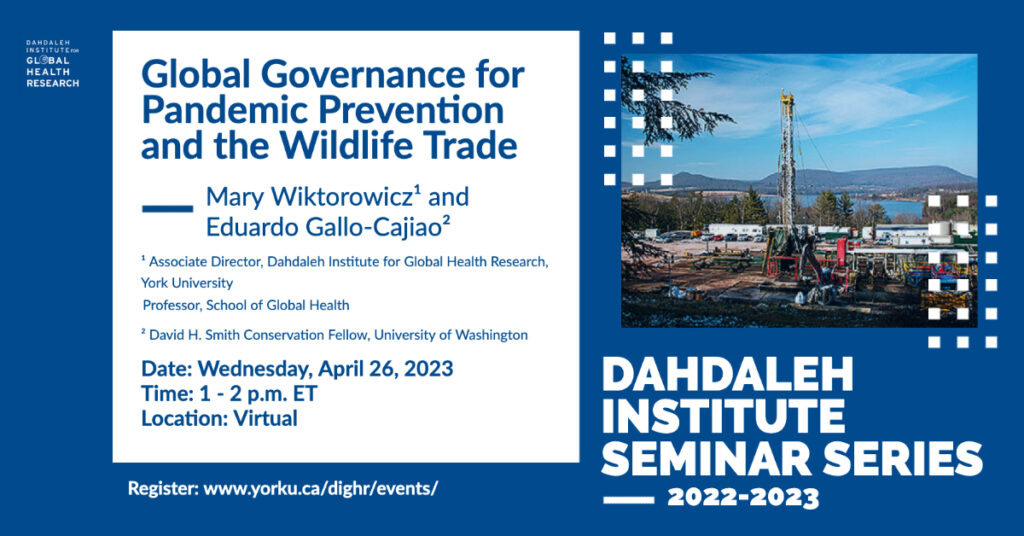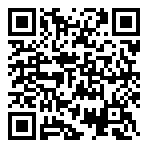Global Governance for Pandemic Prevention and the Wildlife Trade, with Mary Wiktorowicz and Eduardo Gallo-Cajiao
Although ideas about preventive actions for pandemics have been advanced during the COVID-19 crisis, there has been little consideration for how they can be operationalised through governance structures within the context of the wildlife trade for human consumption. To date, pandemic governance has mostly focused on outbreak surveillance, containment, and response rather than on avoiding zoonotic spillovers in the first place. However, given the acceleration of globalisation, a paradigm shift towards prevention of zoonotic spillovers is warranted as containment of outbreaks becomes unfeasible.
In this seminar, Eduardo Gallo-Cajiao (University of Washington) and Mary Wiktorowicz will argue that such an institutional arrangement should be explicit about zoonotic spillover prevention and focus on improving coordination across four policy domains, namely public health, biodiversity conservation, food security, and trade. They posit that this pandemic treaty should include four interacting goals in relation to prevention of zoonotic spillovers from the wildlife trade for human consumption: risk understanding, risk assessment, risk reduction, and enabling funding. As per their recently published in the The Lancet Planetary Health (Gallo-Cajiao et al. 2023), despite the need to keep political attention on addressing the current pandemic, society cannot afford to miss the opportunity of the current crisis to encourage institution building for preventing future pandemics.

Speaker Profiles
Mary Wiktorowicz is Professor of Global Health Governance, Associate Director of the Dahdaleh Institute and member of the WHO Collaborating Centre on the Global Governance of Antimicrobial resistance (AMR). She adopts a comparative lens to study the global governance of AMR with a focus on identifying strategies to improve governance of antimicrobial stewardship. As a member of the Global One Health Network (global1HN.ca) she further assesses the global governance of deep pandemic prevention through approaches that support the prevention of zoonotic emergence including regulation of wildlife trade. She develops frameworks to enhance our understanding of the transnational governance guiding global standards for pharmaceutical safety and efficacy, tracing parallels in the International Council on Harmonization (ICH) and member jurisdiction governance frameworks to clarify their distinctive approaches and dissonance in post-market regulatory policy. She advises government policy including Canadian Senate Standing Committee on Social Affairs, Science and Technology, House of Commons Standing Committee on Health, Health Canada, Ontario Local Health Integration Collaborative on Mental Health, Ontario Ministry of Health and Long Term Care and Nova Scotia Department of Health as a CIHR Best Brain.
Eduardo Gallo-Cajiao is an environmental scientist with an interest in biodiversity conservation research from an interdisciplinary perspective, drawing on political science and ecology. His main research interests gravitate towards understanding the governance for conserving biodiversity, with a particular focus on effectiveness, agency, fit, implementation, institutional complexity, and interactions with other issue areas, such as health and human rights. He holds a Bachelor’s degree in biology from Universidad del Valle in Cali (Colombia), a Master’s degree in environmental science from Macquarie University in Sydney (Australia), and a PhD on global environmental governance from the University of Queensland in Brisbane (Australia). He is currently a David H. Smith Postdoctoral Fellow at the University of Washington in Seattle.
Register below and join us on Wednesday, April 26 at 1 p.m.
RSVP
Registration for this event has closed.
Thank you for your interest in this seminar.
Please find the recap and recording here.

